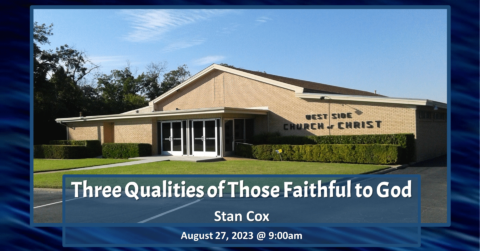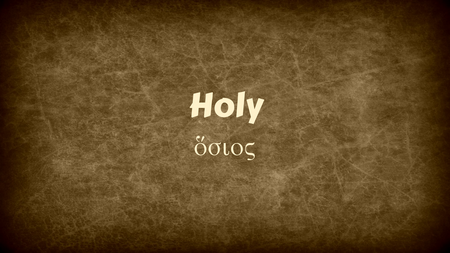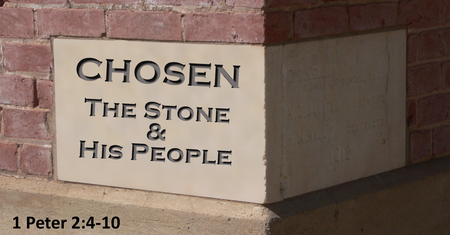Category: Holiness
Subject: Holiness
Mining the Scriptures: 1 Peter 1:17-19

The text continues the call for righteous living by noting that each person is treated the same way by God. He judges “without partiality”, and “according to each one’s work.” This is imminently fair. God does not play favorites. Your standing before Him is a result of appropriate rules He has established that are the same for all men.
So, our sojourn on this earth should be characterized by a respect for the rules of God. Anarchy or rebellion is not acceptable, and will be judged harshly. The gift of grace is much too precious to be treated with disdain. How precious? Our redemption is purchased with something far greater than worldly treasures.
Our redemption is purchased with the blood of Jesus Christ. He who lived perfectly died a sacrificial and vicarious death. He died for us! Isaiah wrote, “But He was wounded for our transgressions, He was bruised for our iniquities; the chastisement for our peace was upon Him, and by His stripes we are healed.” (53:5).
The New Man Compared to the Old

In discussing the characteristics of the old man of sin, which accurately described the Colossians at one time, the apostle then told them in Colossians 3:9-10, “Do not lie to one another, since you have put off the old man with his deeds, and have put on the new man who is renewed in knowledge according to the image of Him who created him.”
The old man is described as one guilty of: fornication, uncleanness, passion, evil desire, covetousness, disobedience, anger, wrath, blasphemy, filthy language, and as seen in verse 9, lying. Continue reading “The New Man Compared to the Old” →
Put to Death Your Members Which Are on the Earth

In Colossians 3:5, the apostle Paul told the Christians there to “Therefore put to death your members which are on the earth: fornication, uncleanness, passion, evil desire and covetousness, which is idolatry.” The reason for this admonition? “Because of these things the wrath of God is coming upon the sons of disobedience…” (vs. 6).
The phrase “members which are on the earth” is an interesting one. These things “members” are aspects of a person that precludes him from serving God acceptably. Specifically, while these things could be considered sinful themselves, they are also the attitudes and characteristics that lead a person to sinful actions. These “members” are characteristic of a lustful, lascivious, hateful and greedy person. So, Christians should “put them to death.” Continue reading “Put to Death Your Members Which Are on the Earth” →
Three Qualities of Those Faithful to God

The qualities of godliness, righteousness and holiness characterize and identify those who please God.
The Call to Holiness

Paul wrote to the Thessalonians, “For this is the will of God, your sanctification: that you should abstain from sexual immorality; that each of you should know how to possess his own vessel in sanctification and honor, not in passion of lust, like the Gentiles who do not know God; that no one should take advantage of and defraud his brother in this matter, because the Lord is the avenger of all such, as we also forewarned you and testified. For God did not call us to uncleanness, but in holiness” (1 Thessalonians 4:3-7). God called us in holiness. This is the big picture that explains why Christians are to live as they do.
This is a sentiment that is expressed throughout the Bible. For example, the apostle Peter quoted from the book of Leviticus when he wrote, “Therefore gird up the loins of your mind, be sober, and rest your hope fully upon the grace that is to be brought to you at the revelation of Jesus Christ; as obedient children, not conforming yourselves to the former lusts, as in your ignorance; but as He who called you is holy, you also be holy in all your conduct, because it is written, “Be holy, for I am holy” (1 Peter 1:13-16). Continue reading “The Call to Holiness” →
The Patternists: Be Reconciled to God
In 2 Corinthians, the apostle Paul makes an impassioned plea for holiness on the part of God’s people, as the proper response to the gift of grace they have received from God. This plea was necessary because of the failures the Corinthians had already experienced in their walk. These failures were clearly enumerated in his first epistle to them.
In chapter 5 of his second epistle, he speaks of the assurance of the resurrection. “For we know that if our earthly house, this tent, is destroyed, we have a building from God, a house not made with hands, eternal in the heavens” (1). He notes the reality of judgment. “For we must all appear before the judgment seat of Christ, that each one may receive the things done in the body, according to what he has done, whether good or bad” (10). He affirms that Christ “died for all” (15). That God “has reconciled us to Himself through Jesus Christ…not imputing their trespasses to them, and has committed to us the word of reconciliation” (18-19).
Holy
The Greek term hosios is found in Titus 1:8, as one of the qualifications for elders, and is translated holy. This is one of 8 times the term appears in the New Testament manuscripts (Acts 2:27; 13:34,35; 1 Timothy 2:8; Hebrews 7:26; and Revelation 15:4; 16:5). As Vine notes in his definition of the term, it is used to refer to God, Jesus, certain Messianic promises to David, and to the character of Christians. It is found 41 times in the Greek translation of the Old Testament (Septuagint).
In Titus 1:8, the reference is to a character trait that must be present in those who would serve as elders. Strong defines it as proper, right, pious, hallowed. Thayer says it refers to those pious toward God, with a special and preeminent sense in which it refers to the Messiah Himself. Vine states that it refers to being religiously right, holy (as opposed to that which is unrighteous or polluted).
All Christians should have this character trait. When we consider that Jesus is perfectly holy, as His disciples we seek to be as He is. This requires us to acknowledge His authority, and to seek to submit to His definition of rightness and piety.
It is not enough to be religious. We must be religiously right. It is not enough to be pious, our piety must be toward God and His will. It is not enough to act as others see to be proper. We must act as God determines is proper. Then, and only then, are we holy. “Because it is written, ‘Be holy, for I [the Lord] am holy’” (1 Peter 1:16).
Click below to…
Sermon: The Burning Bush
In Exodus 3, Jehovah spoke to Moses from the midst of a bush that burned, but was not consumed. A number of important lessons can be learned from that occasion.
Sermon: Chosen: The Stone & His People
An exegesis of 1 Peter 2:4-10, establishing the attributes of both Jesus Christ, as the living, chief cornerston, and those who are his, living stones making up the Lord’s house.
Integrity
“Better is the poor who walks in his integrity than one who is perverse in his lips, and is a fool” (Proverbs 19:1).
Some things are much more important than money, influence or power. Integrity is one of them.
The primary English definition for integrity is: the quality of being honest and having strong moral principles; moral uprightness. This definition accords well with the Hebrew word in our text: tôm — moral innocence (Strong’s).
Strong also uses the word simplicity to define our term. This is interesting, as simplicity contrasts with the term duplicity (deceitfulness, double dealing).
When it comes to our interactions with others are we simple? Is it true with us that, “What you see is what you get”? Are we forthright, honest, truthful with others? Or do we seek to gain advantage by dishonesty, flattery, deceit?
It is true that for a while, a man who is perverse in his lips can personally benefit from his duplicity. That is why we are warned against such individuals who are guilty of “flattering people to gain advantage” (Jude 16). Jude describes them as “sensual persons, who cause divisions, not having the Spirit.” Ultimately he is foolish. His sin will “find [him] out” (cf. Numbers 32:23).
Be “rich toward God” (cf. Luke 12:19). Walk in integrity!
Click below to…
Sermon: The Bible Doctrine of Sanctification

This important concept, developed in both the Old and New Testaments, emanates from God’s character. It explains why God requires what He requires of us. It equips us to live the lives God wants us to live.
The Patternists: Bound by Promise

The Hebrew writer speaks of the promise God made to Abraham. “For when God made a promise to Abraham, because He could swear by no one greater, He swore by Himself, saying, ‘Surely blessing I will bless you, and multiplying I will multiply you’” (Hebrews 6:13-14). We know that God kept His promise to Abraham. We know this because it has been revealed through scripture. However, the promise was certain to be fulfilled as soon as it was made, because God was the One who made it! Consider the writer’s point: “Thus God, determining to show more abundantly to the heirs of promise the immutability of His counsel, confirmed it by an oath, 18 that by two immutable things, in which it is impossible for God to lie, we might have strong consolation, who have fled for refuge to lay hold of the hope set before us” (Hebrews 6:17-18).
Only one thing was needed to show Abraham the surety of the future promise. God cannot lie. The oath He swore by Himself simply showed it “more abundantly.” Because of His nature, what God promised was assured. In this we rejoice, because He has promised hope to those who are His. “This hope we have as an anchor of the soul, both sure and steadfast…” (Hebrews 6:19).
Sojourners and Pilgrims

The apostle Peter made an impassioned petition to the Christians to whom he wrote in 1 Peter 2:11-12, “Beloved, I beg you as sojourners and pilgrims, abstain from fleshly lusts which war against the soul, having your conduct honorable among the Gentiles…” What are these fleshly lusts?
First, the terms defined. 1) “fleshly” (sarkikos) under the control of the animal appetites; 2) “lusts” (epithumia) craving, longing, desire for what is forbidden. (Thayer). So, in our context, fleshly lusts are those desires that come from the basest parts of man — desires that are forbidden by God.
The Bible explicitly names many of these. A partial list includes: premarital and extramarital sex, including homosexuality; covetousness; murder; strife; deceit; violence; pride; gossip; anger; willfulness; rebellion; envy; idolatry; lewdness; hatred; jealousy; drunkenness; partying (revelries); extortion; stealing (cf. Romans 1:28-32; Galatians 5:19-21; 1 Peter 4:3; 1 Corinthians 6:9-10).
When we become Christians, we become new creatures. This world is no longer our home, and our lives should mirror that reality. When we live righteous lives, we will be thought strange by those who act on those fleshly lusts. No matter, for our desire is for our Lord. We are pilgrims in a strange land — heaven is our home!
Click below to…
Sermon: The Relationship Between God and Man

Our God is Sovereign and Holy. He requires holiness of us. When we do good, He blesses us. When we choose to do evil, God’s righteous nature requires punishment. But, it is His desire the men be saved, not lost.









